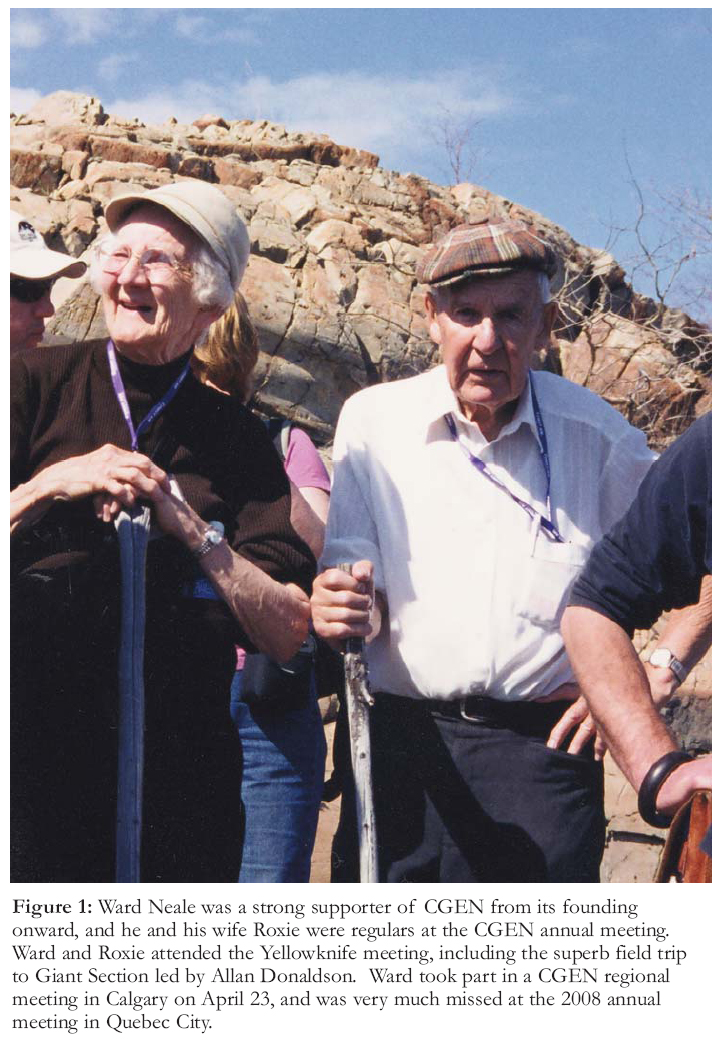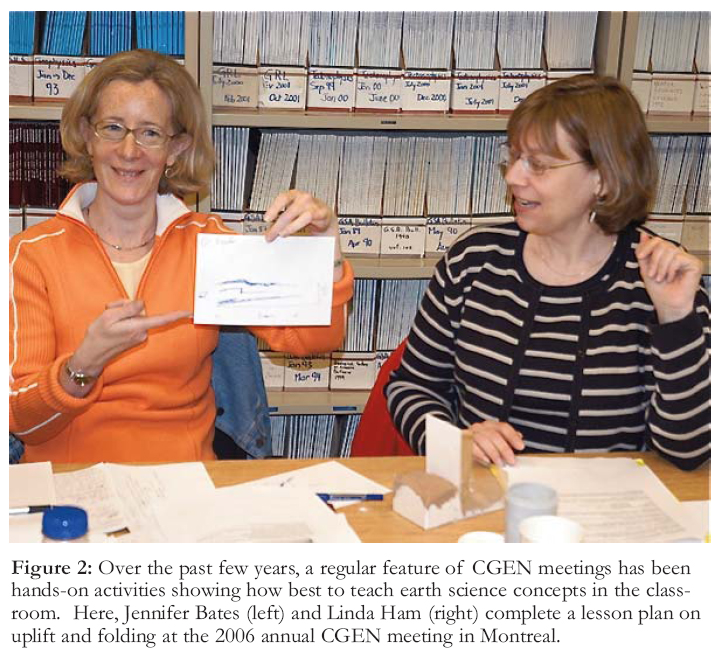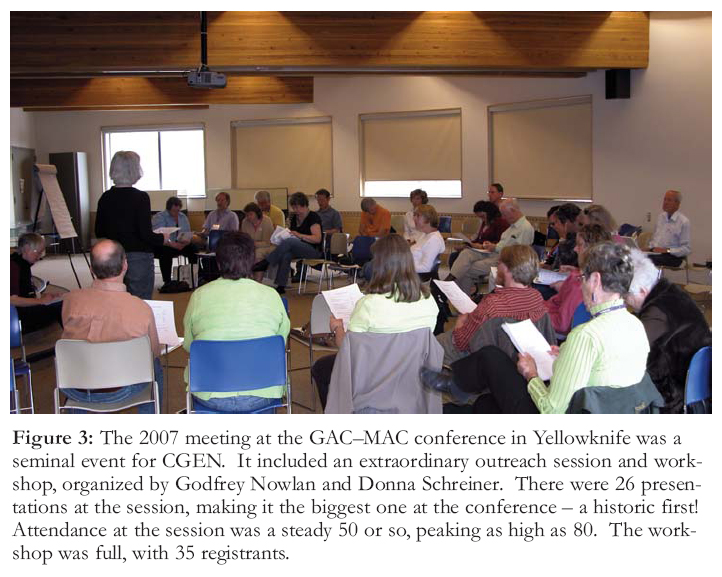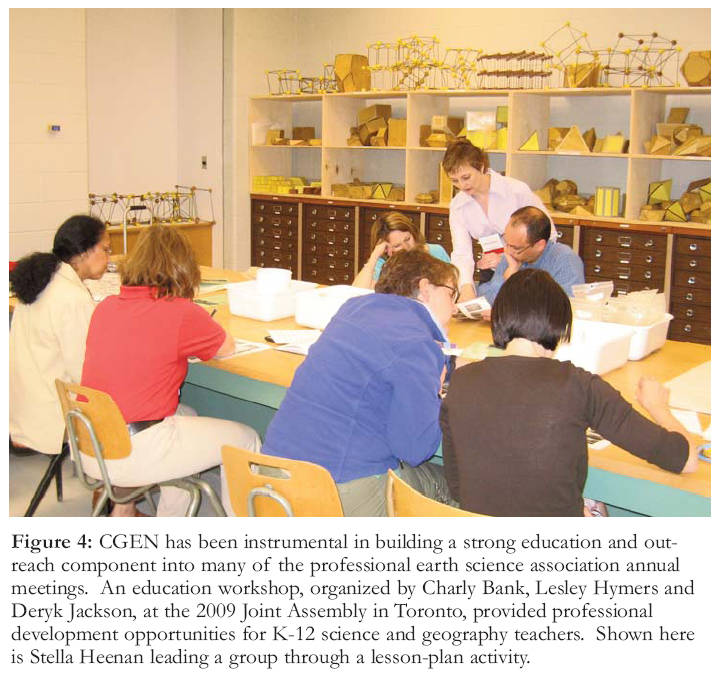Articles
Canadian Geoscience Education Network:
A Grassroots Powerhouse
Christy Vodden398 Hinton Avenue South, Ottawa, ON, K1Y 1B1
cgen@sympatico.ca
SUMMARY
CGEN was founded in the early 1990s by the Canadian Geoscience Council, and now functions as the outreach arm of the Canadian Federation of Earth Sciences. The need to promote and publicize the earth sciences became clear in the 1980s with growing evidence of science illiteracy among the general public. CGEN, with its goal of raising public awareness of the earth sciences through improving the quality of earth science education and public outreach, has enjoyed explosive growth in the past few years, more than tripling its membership to roughly 300. CGEN membership now includes teachers, writers, artists, museum staff, and others, in addition to earth scientists. CGEN is the focal point for earth science education and outreach in Canada. Through it, people are connecting, developing new partnerships, learning from the successes of others, and sharing information, materials and ideas for teaching and promoting the earth sciences. CGEN supports six core programs, including Careers in Earth Science, EarthNet, EdGEO, Friends of Canadian Geoheritage, Geoscape Canada, and What on Earth.SOMMAIRE
Le RCÉG a été fondé au début des années 1990 par le Conseil canadien des géosciences et fonctionne désormais comme l’organisme de sensibilisation de la Fédération canadienne des sciences de la Terre. Au cours des années 1980, il est devenu évident qu’il fallait promouvoir et publiciser les sciences de la Terre auprès du grand public, étant donné la faiblesse des connaissances du grand public en la matière. Poursuivant son objectif de sensibilisation du public aux sciences de la Terre par l'amélioration de la qualité de l'enseignement des sciences de la Terre et la tenue d’activités de sensibilisation du public, le RCÉG a connu une croissance fulgurante au cours des dernières années, et le nombre de ses membres a plus que triplé pour atteindre 300 environ. Le RCÉG regroupe maintenant des enseignants, des écrivains, des artistes, du personnel du musée, et d'autres, en plus de spécialistes des sciences de la Terre. Le RCÉG est devenu le carrefour canadien de l’enseignement et des activités de sensibilisation en sciences de la Terre. Par son entremise, les gens créent des liens, développent de nouveaux partenariats, peuvent profiter des succès d’autrui et se partager de l’information, du matériel et des idées pour enseigner et promouvoir les sciences de la Terre. Le RCÉG parraine six programmes principaux dont Faire carrière en géo-sciences, Géonet, Ateliers EdGEO, Friends of Canadian Geoheritage, Géopanorama du Canada, et What on Earth.INTRODUCTION
1 February 12, 2009, was the 200th anniversary of the birth of Charles Darwin. In the lead-up to it there were all sorts of commemorations and celebrations, but one of the most intriguing was a Facebook site named “Can we find 200 000 people to wish Darwin happy 200th birthday.” The site did, indeed, get well over 200 000 people to sign up, through the magic of one person telling a few others and so on and on – and in only 14 days! All in all, a vivid illustration of how powerful these new social networking sites are at connecting people and getting information!
2 Because the principle is basically the same, it shows why more traditional networking groups like the Canadian Geoscience Education Network (CGEN) can be effective on a smaller scale. CGEN is all about its members sharing information and skills, learning from one another, and helping each other build and promote activities in all parts of the country. The CGEN membership has blossomed in the past few years, from a steady 80 members throughout the 1990s to close to 300 (and growing fast). Consider that each of CGEN’s 300 members is connected to his or her own unique network of friends, family and colleagues, and the multiplying effect is potentially immense.
EARLY YEARS OF CGEN
3 CGEN was founded in the early 1990s by the Canadian Geoscience Council (CGC), and held its inaugural meeting in Edmonton on May 19, 1993. Laing Ferguson of Mount Allison University was its founding chair, and he had the enthusiastic support of many of the leaders of the earth science community – leaders like Ward Neale (Fig. 1), whose memory we are honouring in this special edition of Geoscience Canada. Originally named the Canadian Geo-science Education Board, CGEN’s more populist and inclusive-to-all name was adopted within a year of its founding. It is now the outreach arm of the Canadian Federation of Earth Sciences (CGC’s successor) and is connected to a wide range of groups and associations involved in earth science education, both in Canada and abroad.
Figure 1: Ward Neale was a strong supporter of CGEN from its founding onward, and he and his wife Roxie were regulars at the CGEN annual meeting. Ward and Roxie attended the Yellowknife meeting, including the superb field trip to Giant Section led by Allan Donaldson. Ward took part in a CGEN regional meeting in Calgary on April 23, and was very much missed at the 2008 annual meeting in Quebec City.

Display large image of Figure 1
4 The original intent of the CGC in setting up the Board was to coordinate the outreach and education activities being carried out by the earth science community in Canada. Many excellent initiatives were underway, but they were very much individual efforts scattered all over the country. It quickly became apparent that no one group could set itself up to coordinate such a sprawling suite of activities; rather, what would be really helpful to everyone was a mechanism to share information, ideas and materials – hence the hasty name-change from Board to Network.
RAISING THE PROFILE OF EARTH SCIENCE
5 The need to promote and publicize the earth sciences was an idea whose time really arrived in the 1980s, with key reports identifying it as a priority for action in all sectors of the earth science community, underscored by influential meetings led by the Royal Society of Canada in 1988 (Science and the Public) and 1990 (Communicating Science: Why and How). As well, a loud and clear wake-up call to all branches of science came from the important and damning 1990 survey on science literacy carried out by the University of Calgary’s Edna Einsiedel. It concluded that Canadians, overall, were science illiterates. In days of tightening funding for the sciences, this was a real eye opener and raised many hard questions for earth scientists. Foremost, how were scientifically illiterate Canadian citizens going to make informed decisions on the broad range of earth science-related issues that affect their daily lives?
6 The move to pare off funds from science to support non-science activities like outreach and education was not immediately welcomed in all camps, but over the years the value of informing the public (aka taxpayers) and the political purse-string holders about the contribution of the earth sciences to the country’s bottom line and quality of life won most of the naysayers over. The brilliance of CGEN was that it required next to no funding, and it filled a niche that brought diverse players to the same table to learn about grassroots projects in different parts of the country, and to discuss how they could be adopted or adapted for other regions.
7 More recently, the bulge of baby boomers going through the employment ranks has raised many red flags, with mass retirements forecast in the next few years that will leave shortfalls in all parts of the earth science workforce. With the earth sciences taught in secondary schools in only a few provinces and territories, and with most teachers in elementary school poorly equipped to effectively teach earth science, where is the next generation of earth scientists going to spring from? Clearly teachers and their students, from kindergarten to Grade 12, are a critical target group for earth science information and awareness.
Figure 2: Over the past few years, a regular feature of CGEN meetings has been hands-on activities showing how best to teach earth science concepts in the classroom. Here, Jennifer Bates (left) and Linda Ham (right) complete a lesson plan on uplift and folding at the 2006 annual CGEN meeting in Montreal.

Display large image of Figure 2
8 Little wonder that CGEN, with its goal of raising public awareness of the earth sciences through improving the quality of earth science education and public outreach, has enjoyed explosive growth in the past few years, more than tripling its membership. There are now CGEN members throughout Canada, and they are involved in promoting the earth sciences to students, teachers and the public (Fig. 2). The demographics of CGEN have altered dramatically as well. Throughout the 1990s, the membership was mostly earth scientists. Now the membership is more diverse, and earth scientists have been joined by teachers, writers, artists, museum staff, corporate outreach specialists, and managers of these programs. This broadening of perspectives has injected greater relevance and dynamism into CGEN discussions and activities.
SHARING KNOWLEDGE AND RESOURCES
9 CGEN is truly becoming the focal point for earth science education and outreach in Canada. Through it, people are connecting, developing new partnerships, learning from the successes of others, and sharing information, materials and ideas for teaching and promoting the earth sciences. As well, there is a continuing discussion about issues impacting the quality of earth science education and how the CGEN membership can work toward solutions.
10 CGEN has six core programs that it supports, mainly with leadership commitments, volunteer time and enthusiasm:
- Careers in Earth Science, a website with everything a student needs to make an informed career decision [http://www.earthsciencescanada.com/careers/];
- EarthNet, a virtual resource centre of earth science information [http://www.earthnet-geonet.ca/];
- EdGEO, a national program of workshops about how to teach the earth sciences in the classroom [http://www.edgeo.org/];
- Friends of Canadian Geoheritage, which encourages local groups to help preserve, protect and promote important local geological sites (website in development);
- Geoscape Canada, which produces print and online materials that explain local geology to communities across the country [http://geoscape.nrcan.gc.ca/]; and
- What on Earth, a newsletter about the earth sciences, available at [http://www.whatonearth.org/]
11 New projects are added as the need arises and resources are in place. For example, the Careers in Earth Science project was developed in 2002 to update an existing brochure and web-site, in direct response to the forecasts of projected shortfalls in the work-force. Funding was difficult to pin down, but the project took off when it was selected as a flagship activity for Canada’s contribution to the International Year of Planet Earth (2007-2009). The result is a website that provides students with everything they need to know to pursue a career as an earth scientist. The English version of the website went live in late 2008, with the French site and a national promotional campaign launched in mid-2009. Publicity, maintenance and updating the website will be an ongoing task for CGEN.
12 A defining feature of CGEN’s core programs is that they each use materials provided by the others. The EdGEO workshops and geoheritage group use the Geoscape products, What on Earth, and EarthNet as teaching tools. Materials developed for Geoscape and EdGEO workshops provide content for EarthNet and What on Earth. The careers website supports the goals of all the other projects, and so on. The combinations and connections among the projects are limited only by imagination.
13 As a functioning group, CGEN members keep in touch through meetings and an active email exchange throughout the year, including regular information notices sent out by its long-time Secretary-Treasurer, Christy Vodden. CGEN’s annual meeting is linked to the Geological Association of Canada’s conference in May (Figs. 3, 4), and a winter meeting has traditionally been held in Vancouver. A new initiative is aimed at setting up regional meetings throughout the year, all over Canada, hosted by CGEN regional chapters that are just being set up. Everyone is welcome and encouraged to attend any of CGEN’s meetings.
Figure 3: The 2007 meeting at the GAC–MAC conference in Yellowknife was a seminal event for CGEN. It included an extraordinary outreach session and workshop, organized by Godfrey Nowlan and Donna Schreiner. There were 26 presentations at the session, making it the biggest one at the conference – a historic first! Attendance at the session was a steady 50 or so, peaking as high as 80. The workshop was full, with 35 registrants.

Display large image of Figure 3

Display large image of Figure 4
14 CGEN is completely volunteer-run and, like most grassroots organizations, works on a shoestring budget, but is fuelled by the commitment and enthusiasm of its executive and membership. Funding comes from grants from the Canadian Federation of Earth Sciences, and in the past, the Canadian Geoscience Council and Geological Association of Canada. It has also been the recipient of cash awards from The Canada Prize Awards Foundation. An encouraging trend is that some members have started donating speaker’s fees to CGEN (Allan Donaldson, head of the Friends of Canadian Geoheritage, has been the trailblazer on this front). CGEN’s core projects generally do their own fundraising, with some of them using the CGEN bank account to manage their funds. It does not fund external projects, but it provides support in other valuable ways (its members’ time and involvement, publicity through its membership, alerting its members to funding opportunities, letters of support, and organizing workshops and special sessions at conferences).
15 Membership in CGEN is free to anyone interested in public awareness and education in the earth sciences. Just send an email to cgen@sympatico.ca with “Join CGEN” in the subject line. And for more information, visit the CGEN web site at: [http://www.geoscience.ca/cgen/]
BIBLIOGRAPHY
Clague, J., Turner, R., Bates, J., Haidl, F., Morgan, A., and Vodden, C., 2001, Geoliteracy Canada, a National Geo-science Education Initiative: Geo-science Canada, v.28, p. 143-149.
Nowlan, G., and Schreiner, D., 2007, The State of Earth Science Outreach and an Action Plan for the Future: Geo-science Canada, v.34, p. 49-54.
CGEN Terms of Reference, [http://www.geoscience.ca/cgen/index_en.html#] (click on “Canadian Geo-science Education Network” in “Who we are” box).
CGEN minutes, [http://www.geoscience.ca/cgen/minutes.html].
Canadian Geoscience Council, 1993, Report of the Standing Committees, Canadian Geoscience Education Board, report by Laing Ferguson.